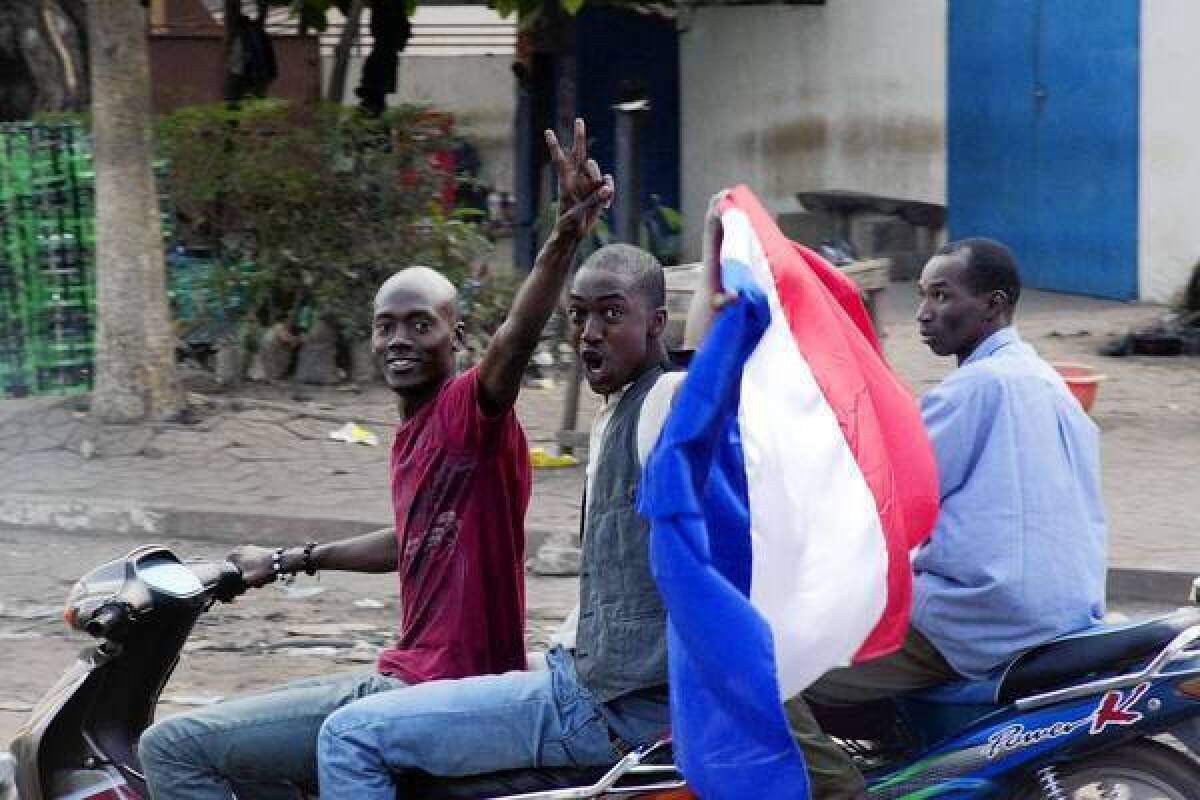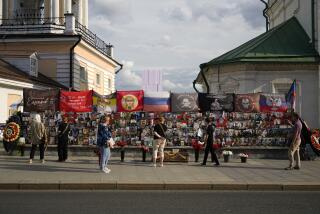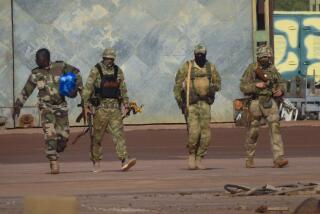France airstrikes in Mali repel Al Qaeda-linked militants

- Share via
JOHANNESBURG, South Africa — French airstrikes in Mali turned back Al Qaeda-linked militants who recently began moving south after seizing a vast northern desert region of the West African nation last year, French officials said Saturday.
French forces drove the Ansar Dine militia from the city of Konna after deploying warplanes and hundreds of troops on Friday to Mali, its former colony, the officials said. A French helicopter was downed in the operation and its pilot, Danien Boiteux, was killed.
An alliance of West African nations, which had spent months planning a long-delayed operation to fight Ansar Dine, responded to the French intervention by promising Saturday to immediately deploy troops to Mali.
The U.N. Security Council last year agreed to the intervention by the alliance, known as ECOWAS. But months dragged on with no action, as Ansar Dine tightened its grip in the north and Western nations grew increasingly alarmed at the prospect of a terrorist haven at Europe’s back door.
The French intervention followed a request from the Malian government to help its ill-equipped forces fighting the militants, who were advancing toward Mopti, a major town where government troops are based, and potentially threatening the capital, Bamako.
“Already, thanks to the courage of our soldiers, a quick stop and heavy losses have been inflicted on our adversaries,” French President Francois Hollande said Saturday in Paris. “But our mission is not at an end. I have made sure that the military presence in Bamako has been reinforced to protect our citizens.”
“The threat is a terrorist state at the doorstep of France and Europe,” French Defense Minister Jean-Yves Le Drian told reporters.
French warplanes and helicopters attacked the militias, dropping bombs and launching rockets in an operation that French military officials said also wiped out a major Ansar Dine base near Konna.
Hollande announced a tightening of French domestic security and said the Mali operation would last as long as necessary. He said brutal terrorist groups, drug traffickers and extremists threatened everyone.
Mali, long seen as a stable democracy in a volatile region, was split in two last year when Tuareg rebels who had fled Libya after the fall of Moammar Kadafi seized the major northern towns of Gao, Kidal and Timbuktu.
The Tuareg fighters were swiftly outflanked by Al Qaeda-linked militants who imposed a severe form of Islamic law in the north, amputating convicted thieves’ limbs, stoning those accused of adultery and destroying ancient World Heritage monuments such as mausoleums in Timbuktu.
France has been playing a more interventionist role in Africa, declaring that it would fight terrorism anywhere on the continent. On Saturday, French forces also launched a raid in Somalia to rescue a French secret service agent held by Islamist militants since 2009; the agent and a French soldier died in the rescue attempt, as did at least 17 militants.
France has about 6,000 citizens in Mali, and numerous French have been kidnapped with the rise of militant groups in the Sahel region, including Al Qaeda in the Islamic Maghreb. Eight French are still being held hostage.
France sees Mali as a particular concern because human traffickers and drug smugglers have been able to cross the region’s porous borders and get to Europe without difficulty. The fear is that terrorists based in northern Mali could use the same routes to cross into Europe and launch devastating attacks.
Kadre Desire Ouedraogo, chairman of the ECOWAS commission, said Saturday that the regional group had decided to swiftly send troops into Mali because of the urgency of the situation. However, the alliance did not confirm how many troops would be sent or when they would arrive.
Ansar Dine threatened to target French citizens in retaliation for the French military operation.
“There are consequences, not only for French hostages, but also for all French citizens wherever they find themselves in the Muslim world,” said Ansar Dine spokesman Sanda Ould Boumama, according to Reuters news service. “We are going to continue resisting and defend ourselves. We are ready to die fighting.”
Malian military spokesman Diarran Kone said the army was combing Konna to ensure no militants remained, the Associated Press reported.
“We are doing sweeps of the city to find any hidden Islamist extremist elements,” Kone said. “The full recovery of the city is too early to determine as we do not yet control the city, and we remain vigilant.”
Special correspondent Kim Willsher in Paris contributed to this report.
More to Read
Sign up for Essential California
The most important California stories and recommendations in your inbox every morning.
You may occasionally receive promotional content from the Los Angeles Times.










